Category: Sin categorizar
Quiport obtains the Sustainable Quito Metropolitan Environmental Distinction for the third time
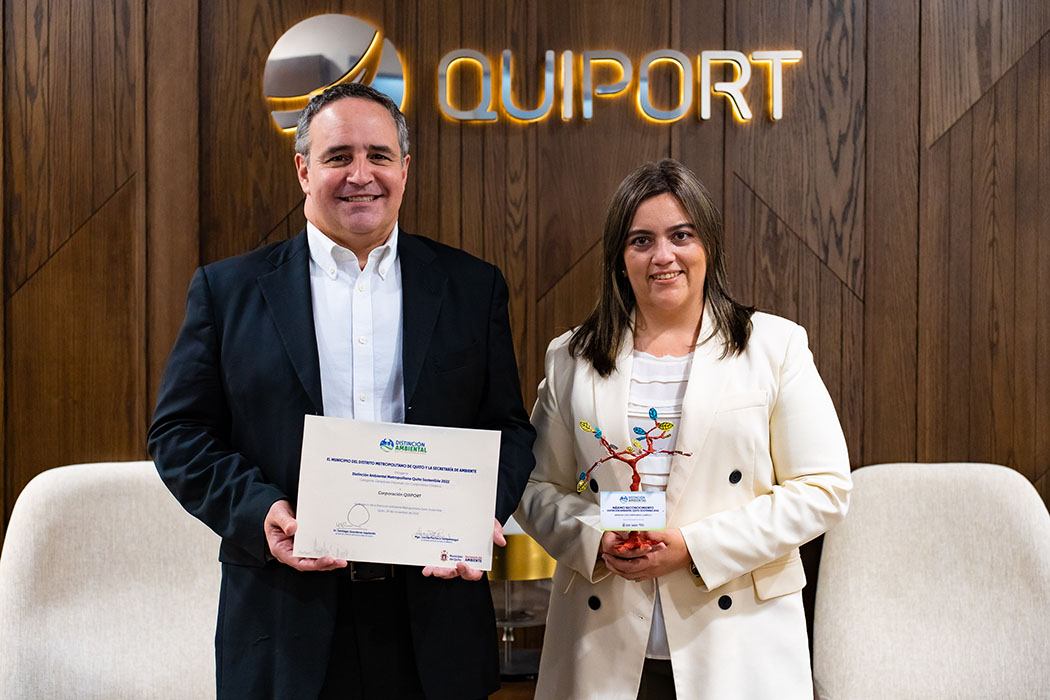
Corporación Quiport received for the third time the Quito Sostenible Metropolitan Environmental Distinction, granted by the Ministry of the Environment of the Municipality of Quito. The purpose of this recognition is to reward good environmental practices and the efforts made to reduce environmental footprints (carbon and water) that contribute to making Quito a better city to live in.
During this year, in the months of August and September, four teams made up of technical personnel from the Ministry of the Environment were deployed, who, in their capacity as technical jury, verified in situ the actions implemented in environmental matters by the participants. As a result of the evaluations, the jury awarded Corporación Quiport S.A. the Quito Sostenible Metropolitan Environmental Distinction 2022, within the category Winners Companies with Climate Commitment.
One of the parameters that obtained a higher score in the evaluation was information management, a key element that allows adequate resource management and facilitates fast decision-making and the application of corrective measures. The other great chapter that obtained a high evaluation was water footprint management. It is important to remember that the Quito airport has a sewage treatment plant that allows the discharge of treated water into the environment that meets national and international environmental parameters.
Ramón Miró, president and CEO of Corporación Quiport, pointed out that this recognition is the result of a long-term commitment by the company with concrete and effective actions that reduce the environmental footprint of the company’s operation. “We have an ethical obligation to the city, the country and the world. Companies cannot remain undaunted by the urgent need to do something so that our activity affects the environment as little as possible. Sustainability cannot only be a corporate discourse, it has to be seen in the facts”, said Mr. Miró.
The eighth edition of this recognition was delivered in a special ceremony held on Tuesday, November 29, 2022 in the halls of the Hilton Colón hotel in Quito.
Quiport receives the Safe Company Seal free of violence and discrimination against women
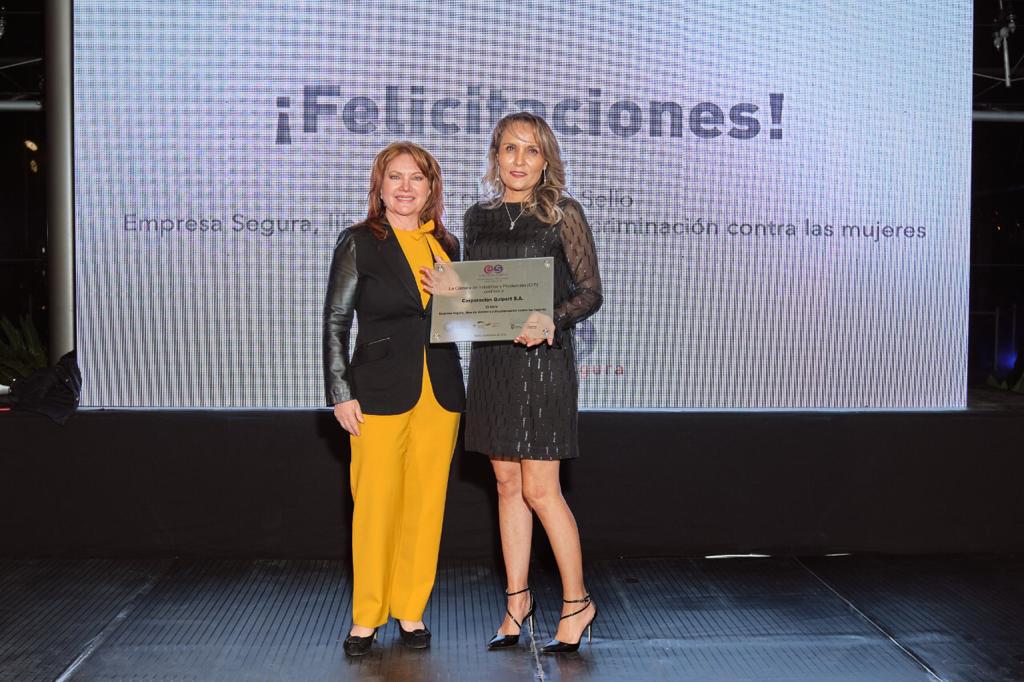
- The recognition was granted by the Chamber of Industries and Production.
- The company has undertaken prevention and awareness initiatives to eradicate violence and has a regulatory framework and a procedure to investigate and sanction possible cases.
Corporación Quiport received the Safe Company Seal free of violence and discrimination against women. According to the Chamber of Industries and Productivity (CIP), promoter of this recognition, it is the highest distinction for companies in Ecuador that promote non-violence against women and equal opportunities between women and men.
After receiving the recognition, Francis Segovia, Financial Director of Quiport, the company that manages the Mariscal Sucre International Airport, emphasized that “Violence against women is one of the most atrocious situations that exist, a problem historically invisible and sometimes even ‘normalized’ by society”. She also explained that “At Quiport we decided that, although there was no type of complaint or report of cases of violence against women, it was our ethical obligation to join the efforts to combat this evil from awareness and prevention, but also generating policies and procedures to eliminate the culture of silence and take actions to protect potential victims of violence and punish those who commit violence, regardless of their position within the company”.
Quiport applied to obtain the Secure Company Seal at the beginning of this year. Previously, some initiatives had already been carried out, such as the implementation of a protocol for the prevention of workplace harassment and gender violence, including a complaints line, while, with the communities neighboring the airport, the company had been working on issues of development of the women through workshops and talks since 2006.
During 2022, the internal focus was to build trust in people so that they can speak safely with their leaders and with the instances created to deal with these cases.
As a result of the evaluation, Quiport formed a multidisciplinary team that was trained to accompany people who may eventually be victims of violence and discrimination in the complaint and investigation process. The team includes a psychologist, doctor, legal support, social management, welfare and an Occupational Health delegate.
Additionally, communication was strengthened with all personnel, including the managerial level, emphasizing the culture of zero tolerance for violence.
In the same way, virtual conferences on the subject were reinforced for the communities surrounding the airport. So far this year we have held 80 talks with more than 3,500 participants.
The company also promotes the development of women in traditional roles assumed by men, and today it has women aeronautical firefighters, women in platform operations, women in cargo operations, women airport bus drivers, and women in engineering. Quiport’s policy has encouraged the participation of women in leadership positions such as the Financial Department, as well as the Legal, Human Talent, Operations, Marketing and Environment departments.
The seal delivery ceremony was held on the night of Thursday, November 24 at the Itchimbía Crystal Palace.
The Safe Company Seal is granted by the Chamber of Production Industries (CIP) in coordination with the Ministry of Labor; the Ministry of Production, Foreign Trade, Investment and Fisheries; and the Public Procurement Service. In addition, it has the technical assistance of the PreViMujer program of the German Cooperation, implemented by GIZ.
634 tons of medicines and medical supplies have arrived in Ecuador through the Quito Airport
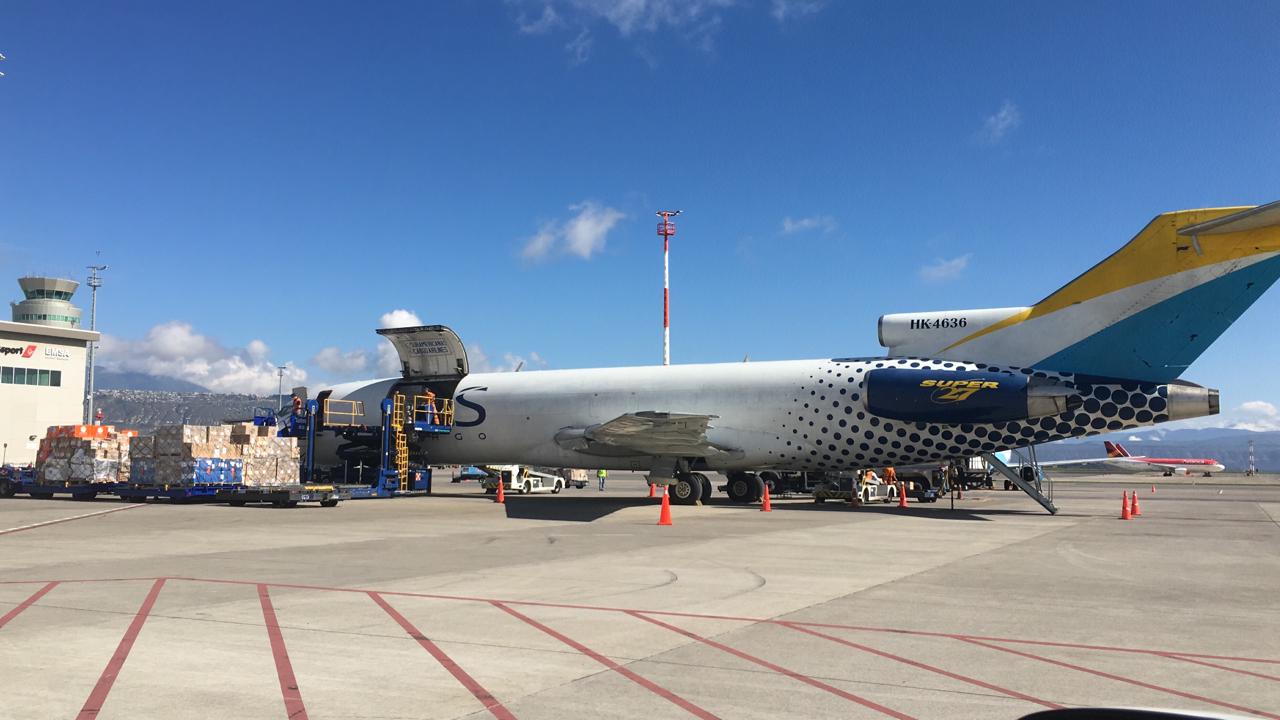
- Since the beginning of the Covid-19 health crisis in Ecuador, the cargo operations of the Mariscal Sucre International Airport has received more than 630 tons of imported medicines and medical supplies. Of this total, 540 tons correspond to medicines and 94 tons to medical supplies in general. Approximately 150 import cargo flights have arrived between March 18 and April 19, 2020.
Quito International Airport is the only direct connection between the city and the world, and for this reason it is vital that operations remain open and support the efforts of the Government and private companies to avoid the shortage of this type of goods in the country.
Other products that arrive in the country by air are industrial supplies, especially for the oil industry, and electronic items.
Precisely last night, Monday, April 20, a DHL Boeing 757-200 arrived at the Quito airport bringing a batch of 5,000 Covid-19 tests imported by the Municipality of Quito. According to Mayor Jorge Yunda, who was present to receive the shipment from South Korea, the tests will be used in the first instance for doctors and nurses, police, the military, traffic, control and other officials who are on the first line of the health emergency. The Municipality announced the acquisition of 200,000 tests that will be arriving in Quito periodically every week.
“Maintaining the cargo operation allows us to continue to directly import medicines, supplies and medical materials into the city to face the health crisis. Thanks to all those who work in the cargo logistics chain, we can have these shipments in the city in a matter of hours, which would otherwise take days or even weeks,” said Quiport President and CEO Andrew O’Brian.
The speed with which cargo flights can arrive from any point on the globe would not be possible without the participation of all the actors in the import logistics chain, from the airlines, including Tabacarcen Logistics Center that receives the shipsments and stores them at temporary warehouses within their facilities, and the National Customs Service (SENAE), key to the rapid nationalization of the goods that enter the country through the Quito airport.
“We trust that, with the joint work between the Government, the Municipality and Civil Society, we will emerge from this crisis more strengthened than ever; meanwhile, the import cargo operation guarantees the arrival of the medicines and supplies that the city and the country need,” concluded Mr. O’Brian.
A CRISIS-PROOF TEAM MARISCAL SUCRE INTERNATIONAL AIRPORT QUITO’S AIRPORT IS THE MAIN ENTRYWAY TO THE COUNTRY. GATEWAY TO ECUADOR LEADS THE OPERATION OF THE QUITO AIRPORT
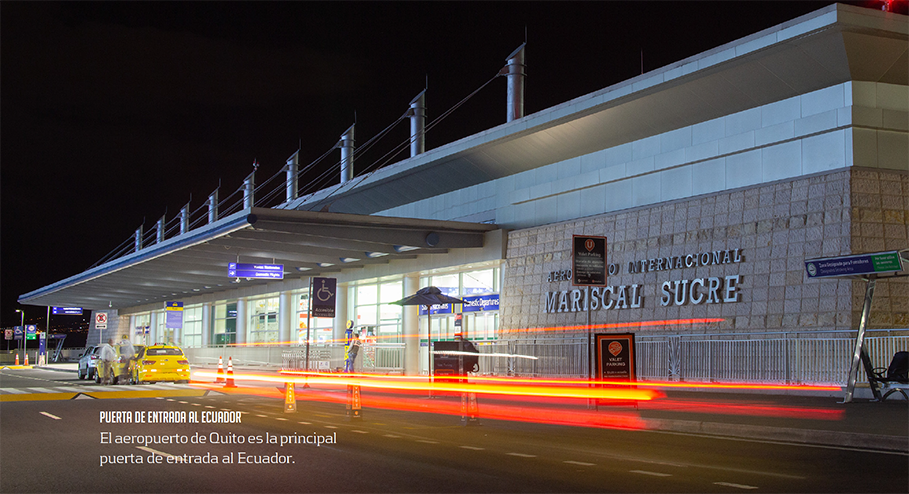
- In the midst of the global crisis caused by the outbreak of the COVID-19, Quito airport keeps its operations running to receive and dispatch flights that, in a world with reduced connectivity, can prove to be essential.
Q uito International Airport is a strategic site for the city and the country; it is the main entry and exit door by air and therefore, since the crisis caused by the Covid-19 pandemic began, the operation of the airport and the controls that the health and immigration authorities carry out have been key in the efforts that Ecuador does to contain the disease.
Andrew O’Brian, President and CEO of Corporación Quiport, the company in charge of the operation and management of the Quito International Airport, explained that “since the beginning of the situation, in mid-January, we have maintained permanent coordination at the highest level with the Ministry of Government, the Ministry of Transport and Public Works, the Ministry of Health, the General Directorate of Civil Aviation, the Municipality of Quito, the Metropolitan Public Company of Airport Services (EPMSA), the airlines that operate in Quito and our commercial operators to guarantee that the measures applied at the city’s airport meet the control objectives while at the same time the international regulations established by the International Civil Aviation Organization (ICAO)”.
Since the first days of this sanitary crisis, the presence of the Ecuadorian Ministry of Public Health has been permanent, applying the necessary prevention and control protocols in
accordance with the alert stages that the World Health Organization has been announcing.
The work carried out at Ecuador’s main airport has not been a simple task. By Government decree, national passenger flights are suspended, as well as the arrival of passengers on international flights. Although air operations have been limited to only cargo flights and a few international passenger departure flights, sanctioned by the Ecuadorian State, the circumstances require increased efforts, especially to manage the operation of export cargo, essential to keep alive the production of flowers, the main export product by air in the country.
Quiport administrative personnel, as well as practically all the dependencies of public and private entities that operate in the airport, are working remotely under home-office measures, while complying with social distancing imposed by the Government. On the other hand, the operations personnel necessary to keep airport open is presently at the bare minimum. Of course, all staff must use personal protective equipmetn such as masks and gloves, and also follow the recommendations to keep a distance of at least one meter from other people, constantly wash their hands and continually use hand sanitizer or alcohol.
“We have a great responsibility to keep operations open, but even greater is our responsibility to the people who work at the airport and to the travelers,” emphasizes Andrew O’Brian. Therefore, another of the preventive measures adopted by Quiport to avoid Covid-19 infections at the airport is the disinfection of the passenger terminal. For this, a broad spectrum virucidal is used, employed in hospitals. The product is applied consistently in all areas through which airport passengers transit.
Communication is another factor that the airport operator has not neglected. In these situations, the natural fear of a pandemic is fueled by disinformation and, aware of this threat, Quiport leadership organized three fronts of communication: internal to company employees, external to companies and institutions that provide service at the airport, which is known as the airport community, and finally public, aimed at the media and public opinion in general.
For Andrew O’Brian, showing leadership has been essential. “Keeping all of our stakeholders informed gave us the necessary space to be able to act calmly, make the appropriate decisions at every juncture and work collectively, while listening to the points of view, concerns and needs of all those who we are involved in the operation of the airport”.
As such, from the moment the Government declared a state of emergency due to the Covid-19 pandemic, Quiport has been acting as a valid mediator between the authorities, on the one hand, and airlines and commercial operators, on the other, to find points of agreement that allow efficiently implement flight restriction measures necessary to control the spread of the disease and prevent people who could be infected with the virus from entering the country.
In this manner, several work sessions have been held, led by the Mayor of Quito, Jorge Yunda, the General Director of Civil Aviation, Anyelo Acosta, Pablo Galindo, Undersecretary of Civil Aeronautical Transport, among other authorities, together with the managers of Quiport and airline representatives to cover all concerns and requirements.
At the same time, a coordination mechanism was also created with the embassies of various countries to establish information channels to provide support to their citizens, while in Ecuador.
Taking advantage of lessons learned from previous situations – such as the social protests that paralyzed the country for 10 days in October 2019 – mechanisms are implemented to regulate the entry of passengers to the terminal and the administrative building, located in front of the terminal. An area has been fitted to accomodate passengers who must stay overnight at the airport while waiting for their flight abroad. We are deeply concerned for our users; Quiport serves snacks and hot drinks to dozens of passengers who spend the night waiting for their flight to make the hours of stay a little more bearable.
Behind all this is, according to Andrew O’Brian, a team of highly committed and highly professional workers. “The most resilient companies are those that can face crises and overcome them to move forward. Resilience is something we have acquired over the years, facing together many complex situations that have occured in the airport industry and others product of the social and economic environment in which our operation is run. The team knows that together we will prevail and we will emerge stronger from this situation.”
But it is also essential to have the support of the authorities. EPMSA is the municipal entity that acts as Quiport’s counterpart in the Public-Private Alliance for airport management. “The excellent relationship we have with the General Manager of the EPMSA, Sandro Ruiz, allows us to maintain a direct channel at the highest municipal level to ensure total alignment, essential to develop proactive management; Sandro Ruiz fully understands our role, allows us to act and intervenes in a timely manner when circumstances demand it.”
And at the end a look to the future. “We hope that this situation ends soon and we are aware that the negative effects will be felt for months. We, the nine thousand people and more than 100 entities that work at the airport, are ready to recommence our activities with resolve and resume our role as one of the main economic engines of Quito and Ecuador.”
CARGO OPERATIONS HAVE NOT STOPPED
A total 69 cargo flights have left the Quito International Airport between the 18th and 29th of March, transporting 2,500 metric tons of export cargo to the world.
Restrictions imposed on air transport do not affect international cargo flights, however, due to the global health emergency caused by the Coronavirus pandemic, international markets have decreased their demand. Similarly, cargo imports continue to develop to supply the country with the products and supplies necessary for various activities.
“Keeping the cargo operations open allows the country’s producing sector active, specifically the one related to flower production. The airport is the main point of entry and exit of goods for Quito and its area of influence, therefore, it is essential to continue with the cargo operation, fulfilling the commitment made to the Mayor of Quito, Jorge Yunda, to continue supporting the productive activities of the city,” says Andrew O’Brian, President and CEO of Corporación Quiport.
The entire air cargo logistics chain is still operational, starting in Tabacarcen, a logistics center that houses 70% of the air cargo consolidation, as well as the four palletizers that work in the export cargo terminal: Novacargo, Pertrally, Aerosan and Servipalet . Cargo airlines continue to arrive at the airport, although some flights were suspended due to lower demand.
All the actors in the logistics chain have taken all the necessary protection measures to prevent infection among their collaborators, equipping them with the necessary personal protection equipment, and at the same time continuing with their daily operations.
“It is a difficult time for everyone, however, we have a great responsibility to the country. All of us involved in the activity of air cargo transportation are very well aware of this fact. We are very grateful for the commitment, will and effort of the companies involved and their work teams, who are allowing us not to stop,” concludes Andrew O’Brian.
CARGO OPERATIONS ARE KEY TO KEEP THE PRODUCTIVE SECTOR RUNNING AND TO IMPORT MEDICINES AND MEDICAL SUPPLIES
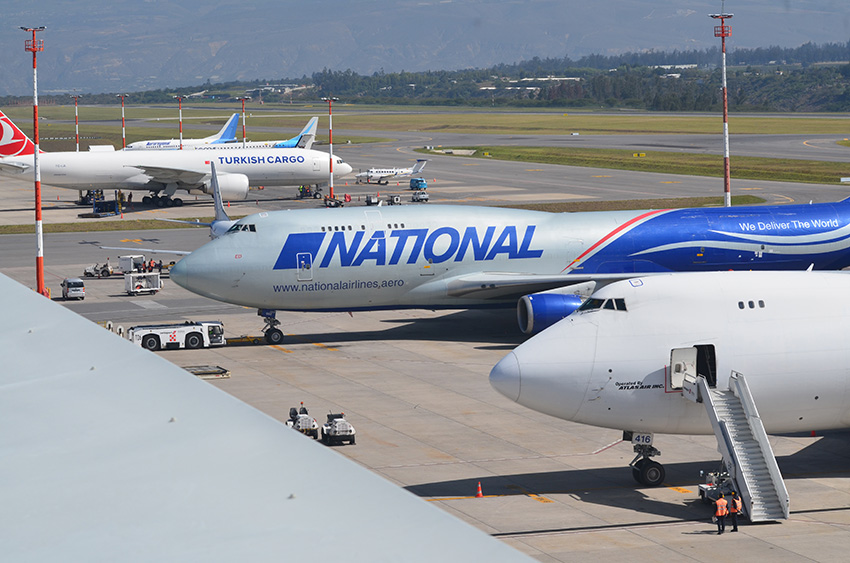
A total 69 cargo flights have left the Quito International Airport between the 18th and 29th of March, transporting 2,500 metric tons of export cargo to the world. Restrictions imposed on air transport do not affect international cargo flights, however, due to the global health emergency caused by the Coronavirus pandemic, international markets have decreased their demand. Similarly, cargo imports continue to develop to supply the country with the products and supplies necessary for various activities.
“Keeping the cargo operations open allows the country’s producing sector active, specifically the one related to flower production. The airport is the main point of entry and exit of goods for Quito and its area of influence, therefore, it is essential to continue with the cargo operation, fulfilling the commitment made to the Mayor of Quito, Jorge Yunda, to continue supporting the productive activities of the city,” says Andrew O’Brian, President and CEO of Corporación Quiport.
The entire air cargo logistics chain is still operational, starting in Tabacarcen, a logistics center that houses 70% of the air cargo consolidation, as well as the four palletizers that work in the export cargo terminal: Novacargo, Pertrally, Aerosan and Servipalet . Cargo airlines continue to arrive at the airport, although some flights were suspended due to lower demand.
All the actors in the logistics chain have taken all the necessary protection measures to prevent infection among their collaborators, equipping them with the necessary personal protection equipment, and at the same time continuing with their daily operations.
Santiago Gómez de la Torre, General Manager of Tabacarcen, explains that air transport fulfills a role that in many cases can be vital. “International cargo flights mainly transport medicines and medical supplies, protective equipment, industrial products, as well as household items,” he reports.
Regarding the consolidation of export cargo, many flower orders have been canceled, which directly affects the consolidators, but even so trucks continue to deliver flowers at the international cargo terminal for export, although not in a reduced quantity. This causes the facilities to be working at a third of their capacity.
Meanwhile, Eduardo Emanuele, General Manager of Pertrally, one of the four palletizers that operate in the cargo terminal of the Quito airport, considers that “all of us actors are making great coordinated efforts to maintain the export activity.”
“With Quiport’s leadership, we have all pitched in, although the impact is serious. We estimate a reduction of 35% of what we normally transport. Around these dates we’d normally be bustling with activity as part of the high season for Mother’s Day, which, under present circumstances, will not occur this year as it has in previous years,” said Eduardo Emanuele, who calls for continued efforts to achieve the success of the export operation that is an essential part of the country’s economy.
Elizabeth Suárez, General Manager of PrimeAir, a representative of two cargo airlines operating in Quito, explains that, despite the drop in demand – mainly due to the fall in the European market – Middle Eastern, Asian, Australian and Russian markets mantain a semblance of normalcy. Meanwhile, in the United States, the drop in demand has began to be felt during the past week.
“The importance of keeping air cargo operations active is fundamental since we are not only involved with the movement of flowers and fruit, which by the way is an industry that has been hit hard by this crisis and must be fully supported, but also in the transport medicines and medical supplies that can help us be best prepared for this situation. Furthermore, it allows us to maintain important connectivity between Ecuador and the world,” remarked Elizabeth Suárez.
“It is a difficult time for everyone, however, we have a great responsibility to the country. All of us involved in the activity of air cargo transportation are very well aware of this fact. We are very grateful for the commitment, will and effort of the companies involved and their work teams, who are allowing us not to stop,” concludes Andrew O’Brian.
QUITO INTERNATIONAL AIRPORT WILL PROVIDE THE FACILITIES REQUIRED BY THE STATE FOR THE REPATRIATION PROTOCOL
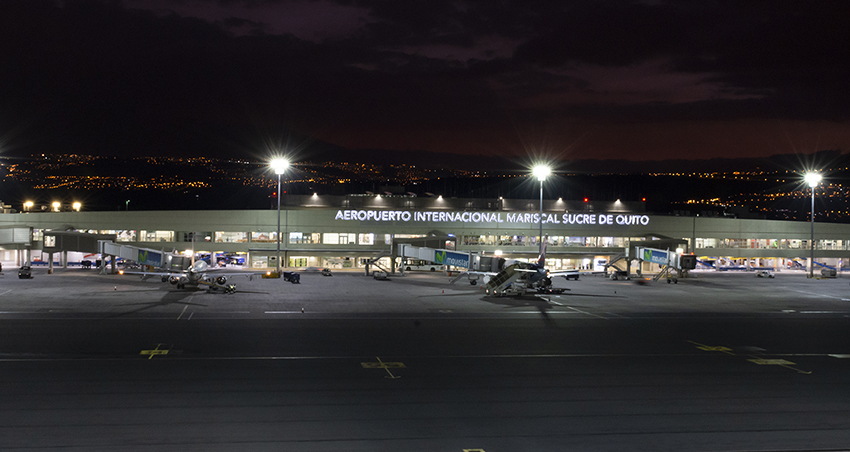
The National Government has approved a protocol for the repatriation for minors who are overseas without their parents, pregnant women, people with disabilities and the elderly. The document establishes specific responsibilities for the various government entities that have jurisdiction in this situation, such as the Ministry of Foreign Affairs, the Ministry of Public Health, the Ministry of Government and the General Directorate of Civil Aviation.
Yesterday, March 24, the Municipality of Quito also approved this protocol, making it clear that the aforementioned government entities must guarantee compliance with all sanitary control and security measures when these passengers enter the country in the event of use Quito International Airport as an entry point. Corporación Quiport, as it has been doing, is ready to work with the Government and will provide all the facilities so that State entities can fulfill their responsibilities under this protocol.
QUITO AIRPORT KEEPS ITS OPERATIONS OPEN AND MANAGES HUMANITARIAN FLIGHTS
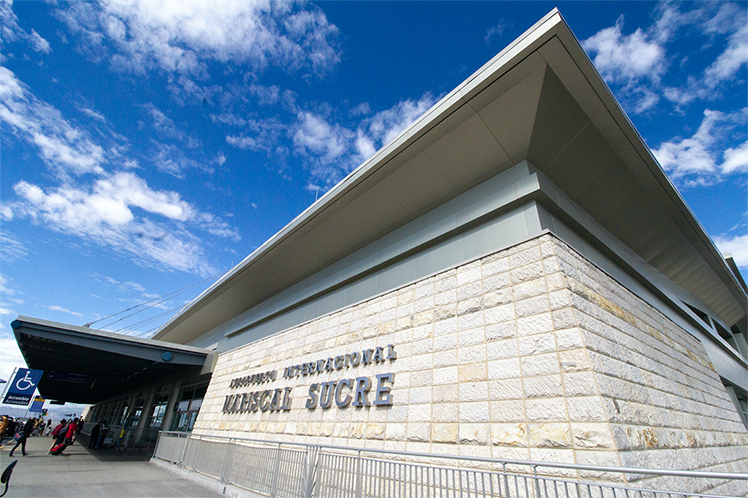
Operations at the Mariscal Sucre International Airport in Quito remain open, with the restrictions established by the Government of Ecuador and the Municipality of Quito to stop the spread of Covid-19. Humanitarian flights to repatriate foreigners from Ecuador to Europe are being carried out normally from the Quito airport.
Corporación Quiport, the company in charge of the operation and management of the Quito International Airport, are working at the highest level with the Ministry of Government, the Ministry of Transport and Public Works, the Ministry of Health, the General Directorate of Civil Aviation, the Municipality of Quito and the Metropolitan Public Company of Airport Services to guarantee the operation of humanitarian flights and that the measures applied at the Quito airport comply with international regulations.
Operations at Quito airport are carried out in compliance with governmental and municipal regulations, framed in international regulations:
- The arrival of international passengers, whether foreign or Ecuadorian, is suspended.
- International departure flights are authorized. Some airlines are making international departure flights from Ecuador for which they bring empty planes – a ferry operation – which will then depart with their passengers from the Quito airport.
- Domestic flights are suspended throughout the country. The General Directorate of Civil Aviation, in coordination with the Municipality of Quito, may, in an exceptional manner, authorize national flights for justified situations.
- International cargo flights are authorized.
- Military or air ambulance flights are authorized.
- The application of these measures is valid until April 5.
Corporación Quiport has been carrying out a disinfection process of the entire passenger terminal, that is, national and international arrivals and departures areas, as well as public halls. For this effect, we are using a broad spectrum virucidal that allows immediate disinfection.
We recommend foreign citizens who wish to leave the country by air to consult with the airlines that operate in the city about the travel options they offer, or to contact the embassies of their countries, who can guide and provide support.
Andrew O’Brian
President and CEO
14 INTERNATIONAL FLIGHTS HAVE DEPARTED FROM THE QUITO AIRPORT UNTIL SUNDAY, MARCH 22
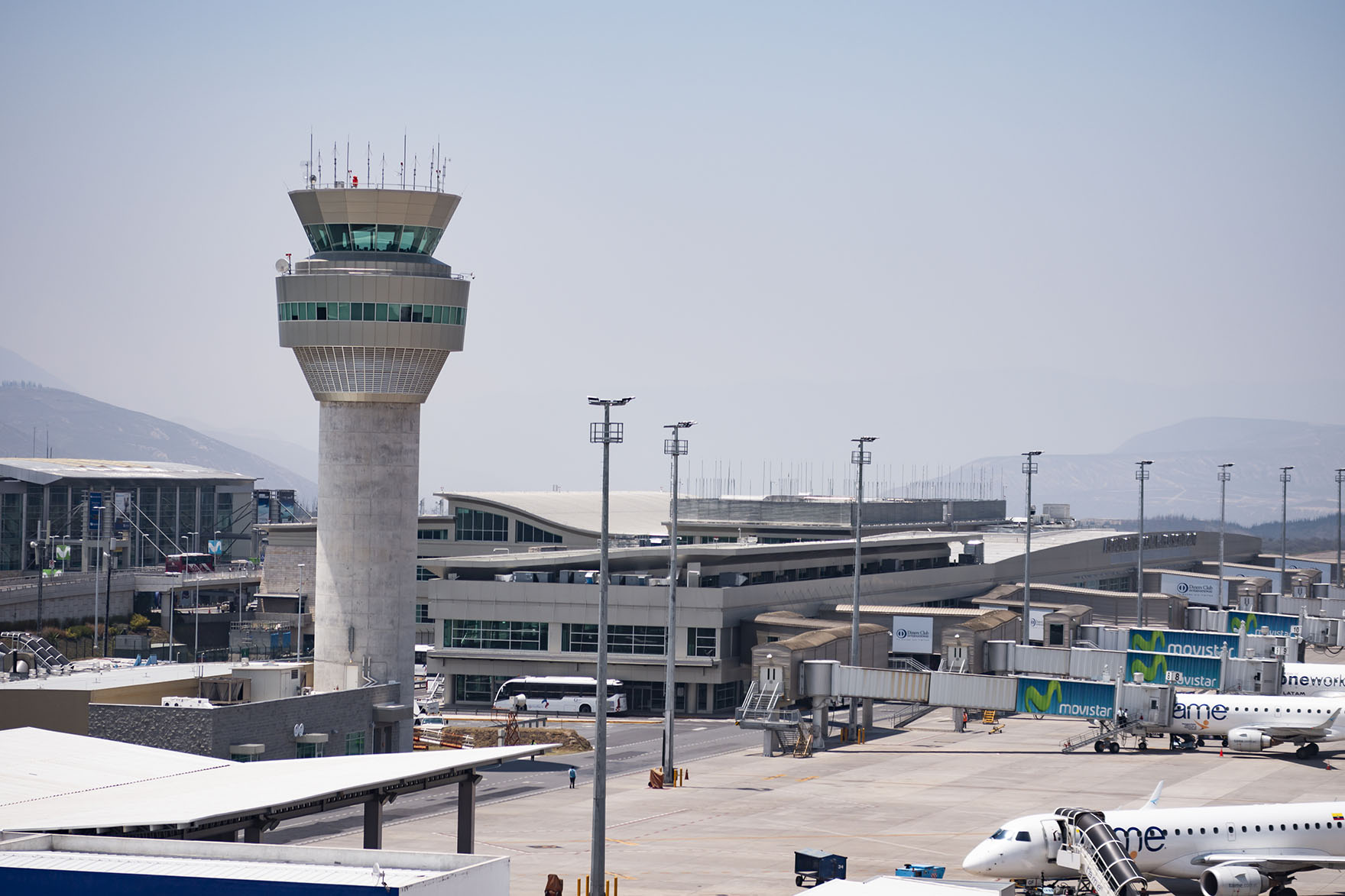
As of Tuesday, March 17 to Sunday, March 22, a total of 14 humanitarian flights carrying passengers abroad will have departed from the Quito International Airport, allowing the repatriation of nearly three thousand people, most of them European citizens or residents.
Including this evening’s airlifts, KLM will have carried out 4 humanitarian flights (to Amsterdam); Air France: 3 (Paris); Iberia: 2 (Madrid); Avianca: 2 (Bogota); Copa: 1 (Panama City); Aeroregional: 1 (Toluca, Mexico) and Tame: 1 (Fort Lauderdale, United States). A second flight from Tame is scheduled to depart for Fort Lauderdale in the early hours of Monday, March 23.
Passenger operations are interrupted, with the exception of international passenger departure flights that are permitted for humanitarian reasons such as repatriation. These aircraft arrive at the Quito airport empty, which is known in the industry as a “ferry operation”, they board passengers at the airport terminal and leave the city. It is important to remember that Air cargo operations are allowed.
Andrew O’Brian, President and CEO of Quiport, explained that it is vitally important to keep the airport open and allow humanitarian flights. “There are people at the airport working diligently so that foreigners who need to travel to their countries can do so. We are taking all security measures for everyone who is working at the airport. I am deeply grateful for everyone’s work, because they are doing it in good spirits, understanding that there is a very powerful human factor behind: allowing foreigners in Ecuador to get back home.”
Airline crews that, in compliance with international regulations on the maximum time that they can pilot an aircraft, must stay overnight in the country to rest, the Ecuadorian General Directorate of Civil Aviation issued a security protocol that is observed and complied with by all the airmen. The protocol includes medical checks and measures of social distancing.
Due to the drastic decrease in flights, some 50 people from the airlines that operate humanitarian flights currently work in the passenger terminal, plus aviation security in charge of the Metropolitan Public Company of Airport Services, Migration, General Directorate of Civil Aviation, private security, cleaning and Quiport Operations personnel. All the people who must continue working in the passenger terminal have the appropriate protections such as masks, gloves and hand sanitizer available at all times.
QUITO AIRPORT OPERATES WITHIN GOVERNMENTAL AND MUNICIPAL PROVISIONS
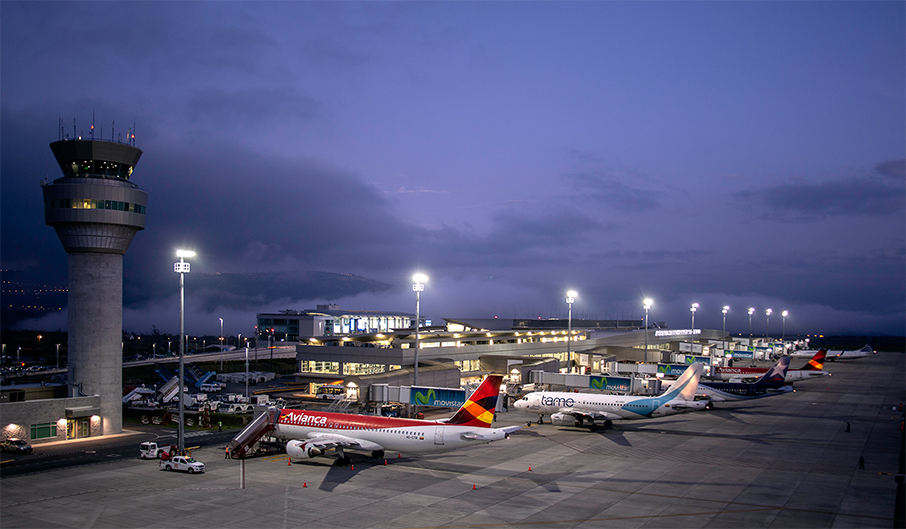
The Municipality of the Metropolitan District of Quito, using its powers to oversee the city’s airport service and in accordance with the decrees of the National Government, confirmed that international arrivals at the Mariscal Sucre International Airport of flights with passengers whose final or intermediate destination is the city of Quito will not be allowed.
The city authority also emphasizes that international cargo flights, aircraft that arrive without passengers to Quito to carry passengers abroad, as well as military and air ambulance flights, contemplated in Ministerial Agreement 003 of the Ministry of Transportation and Public Works, will be permitted to operate.
Corporación Quiport, the concessionaire in charge of the administration and operation of Quito’s airport, reiterates its predisposition to abide by all state, national and local guidelines, framed in the law and in the powers of each establishment.
According to the Municipality, these are policies that focus on favoring the wellbeing of the general population.
We ask citizens to follow health recommendations, avoid listening to and replicating rumors and false information, and to report through official channels.
QUITO INTERNATIONAL AIRPORT IMPLEMENTS A SUCCESSFUL ROUTE DEVELOPMENT STRATEGY
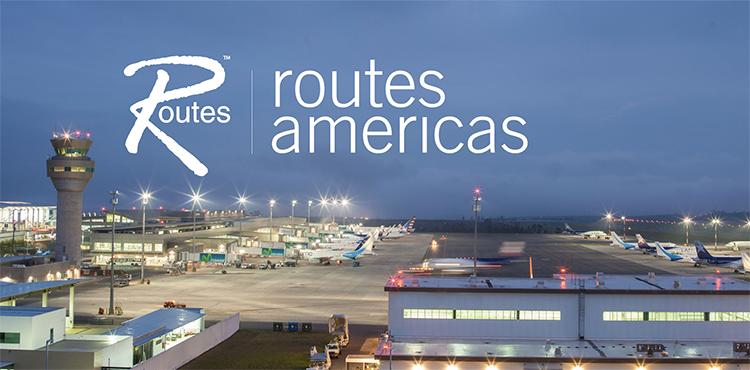
Corporación Quiport, the concessionaire responsible for the general management of the airport, constantly promotes joint work strategies with domestic and international airlines to increase connectivity. This makes Quito International Airport an attractive and safe place for operations, with high levels of service.
Corporación Quiport works non-stop to develop connectivity. This year at the Routes Americas 2020 held in Indianapolis, USA, Quiport’s Route Development team met with 22 airlines and airports to discuss and seek partnerships to bring new airlines to the Ecuadorian market and increase destinations and frequencies.
Mariscal Sucre International Airport is the main gateway that connects the city and Ecuador to the world. For several years, Corporación Quiport has implemented a route development strategy to attract more airlines to the country, under the premise that airlines are not just customers and users of the airport but are strategic partners for the growth of connectivity.
Quiport works with these companies on a continuous basis through direct conversations to attract new airlines to Quito and develop new routes or increase capacity and frequencies on existing routes. It is also responsible for creating a positive ecosystem so that airlines can operate successfully at the airport.
Andrew O’Brian, President and CEO of Corporación Quiport, explains that participating in Routes Americas has special importance as it is the basis for the entire strategy to increase connectivity at Mariscal Sucre Airport. “Participating in Routes Americas allows us to follow up on conversations and negotiations with various airlines, but it is also an ideal opportunity to propose new direct flights and present airlines with studies and figures on their potential. During our meetings with the airports, we establish joint strategies and incentive packages for the airlines we want to open routes with”. He adds that 2019 was a year of record growth in connectivity at Quito Airport since it opened in 2013.
Quiport understands that the development of a new route and increases in frequencies and capacity require the airline to invest significant resources and to take on risks. With a flexible policy, the concessionaire seeks to share part of the risk of route development. This is why it works together with the Municipality of Quito and the central government, in conjunction with airlines, to develop incentive plans tailored to the needs of each airline.
Thanks to the work strategies with the airlines, today Quito International Airport is highly valued for creating a collaborative ecosystem which facilitates the development of airline operations. This is designed to serve both new companies starting up operations and those already operating in the city.
